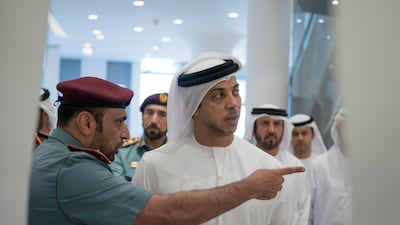Creative new ways of expanding the UAE's message abroad was the focus of a new diplomatic body's first meeting involving a number of the country’s top diplomatic officials.
Chaired by Sheikh Mansour bin Zayed Al Nahyan, Deputy Prime Minister of the UAE and Minister of Presidential Affairs, the UAE Soft Power Council convened on Monday as part of the two-day UAE government annual meetings to come up with a UAE Soft Power Strategy to increase the country’s global reputation abroad by highlighting its identity, heritage, culture and contributions to the world.
“The UAE’s Soft Power Strategy is a comprehensive framework for all sectors in the country,” said.
Sheikh Mansour. “The responsibility of the UAE’s reputation is also the responsibility of any person and group in the UAE. Our goal is to build a strong reputation for the nation, through which we can achieve our developmental, economic and cultural goals and ambitions.”
Sheikh Mansour noted the UAE’s ambitious political leadership, strong economy, significant cultural initiatives, along with its infrastructure, which he said is the best in the world, “support us in leapfrogging our soft power.”
“The UAE is an urban metropolis and an important hub in the region,” said Sheikh Mansour. “We have developed in a remarkable way, and can offer a model for development for many other countries around the world.”
He added, “The UAE is a regional and global platform that embraces Arab culture and global best practices; we are a global meeting point, an essential gateway to the Arab world, and offer a platform for a renaissance in the Arab world.”
“The people of the UAE are a valuable part of our Soft Power Strategy, and open communication with them is as much a priority as communicating with government entities; we will develop an institutional framework for communication, so we may deliver our message to many parts of the world,” he concluded.
The strategy is based on four main objectives, which are to develop a unified direction for various sectors including the economy, humanities, tourism, media and science, and to promote the UAE’s position as a gateway to the region. In addition, to establish the UAE as a regional capital for culture, art, and tourism, and to establish its reputation as a modern and tolerant country that welcomes all people from across the world.
The strategy also includes six main pillars that together form the framework for the UAE’s public diplomacy: humanitarian diplomacy, scientific and academic diplomacy, national representatives diplomacy, people diplomacy, cultural and media diplomacy, and economic diplomacy.
Sheikh Mohammed bin Rashid Al Maktoum launched the UAE Soft Power Council in May, enlisting it to develop the country’s soft power strategy to include the culture, technology, humanitarian, science and economic sectors, in order to establish relationships at the grassroots level with partners both in the Middle East region and globally.

